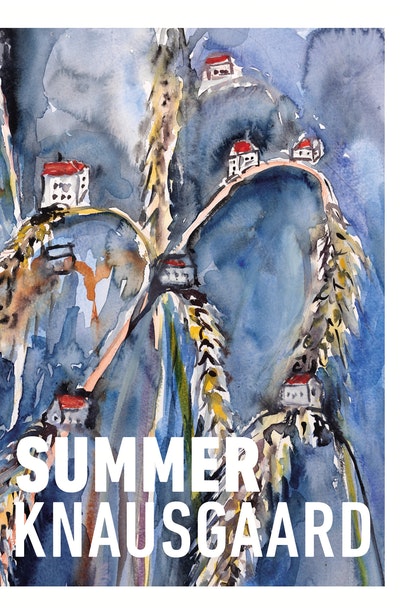- Published: 16 March 2022
- ISBN: 9781784703295
- Imprint: Vintage
- Format: Paperback
- Pages: 416
- RRP: $30.00
Summer
Extract
Lawn Sprinklers
That I have my own lawn sprinkler has never quite dawned on me, it was just one of the many things I acquired when we bought this house, like the lawnmower, the garden shears, the rakes and all the other equipment that belongs in a garden. Though I have fastened the hose to the tap in the porch of the summer house countless times, have heard the water first hiss, then rush through the hose, and then seen the thin jets of water rise in the garden, maybe five metres into the air, often glittering in the sunlight, and, slowly wavering, fall to one side, before rising again and falling to the other side, in a movement that has always made me think of a waving hand, I have never connected it with myself or my life, as if what it represents doesn’t represent me, or in other words that the life I lead here isn’t really mine, but merely something I happen to be doing right now.
To draw such a far-reaching conclusion from something as insignificant as a metal arm full of holes through which water flows may seem overblown, but of all the things I remember from the summers when I was growing up, the lawn sprinkler is the most emblematic, it is the single object around which the greatest number of moods and events cluster in my memory and which evokes the most associations. Every household in the development had a lawn sprinkler, and all of them were of the same type, so that these fine, glittering arcs of water could be seen everywhere on summer days when the sun was shining. Often the lawns they stood on were deserted, as if the sprinklers led their own independent existence, like some large friendly water-based creatures. When water landed on the lawn the sound was nearly inaudible, nothing more than a fine light sprinkle, which might be drowned out by the rushing noise from the hose or from the tap if the hose wasn’t screwed on tightly, while the sound could rise to a rustle or even a patter if the sprinkler was positioned so the water struck the leaves of trees or shrubs. These sounds, which rose and fell seemingly methodically and patiently, as if from some painstaking labour, and which also contributed to the feeling that the arc of water was an independent being, could last all day and into the evening, unaffected by the other activities of the residents, sometimes even throughout the night, though that was rare, for some reason or other it wasn’t thought proper to water the garden in the dark. At our house my father was in command of the sprinkler, I can’t remember ever seeing my mother moving it or turning the water on or off, though I don’t know why this was so. The tap was in the basement laundry room and the hose ran out into the garden through the narrow rectangular basement window, which on the inside was high up, right beneath the ceiling, while outside it was low down, just above the ground. That the window couldn’t be properly shut while Dad was watering produced a faint ache in me, while on the other hand the window’s different height above the ground inside and outside the house exerted a magical pull. The arc of water in all its aspects, visual and auditive as well as its usefulness in the garden, represented something unconditionally good. That I myself am now master of a sprinkler and both turn it on and move it around unaided, in my own garden, ought therefore to mean something to me, if not a lot, at least a little, since the life which back then I only observed – the life of grown men and women – has now become mine, something I no longer regard from the outside but fill from within. It doesn’t, I take no particular joy in turning on the sprinkler, no more than I find pleasure in buttering a slice of bread or taking off my shoes as I enter the house. Now it is the world of the child that I observe from the outside, and what more fitting image for this asymmetry in life could there be than the basement window, which is at once high up beneath the ceiling and low down near the ground?
Summer Karl Ove Knausgaard, Anselm Kiefer
Summer is the fourth volume of the Seasons quartet, a collection of short prose and diaries written by a father for his youngest daughter, with stunning artwork by Anselm Kiefer.
Buy now











